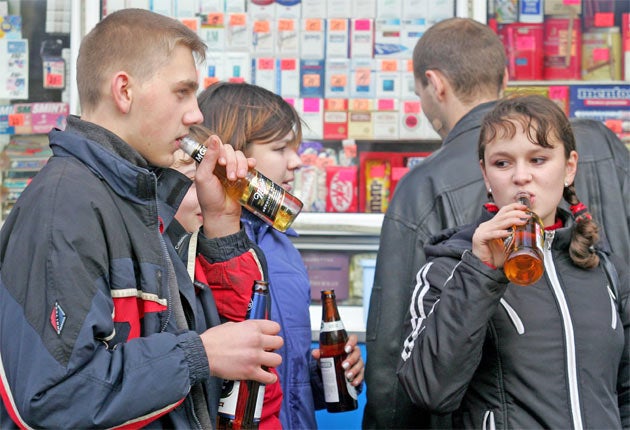End of a drinking culture? Russia accepts that beer is alcoholic
New law also bans sale of alcohol on all forms of transport, at stations and airports, and bans advertising on television, radio and billboards

Your support helps us to tell the story
From reproductive rights to climate change to Big Tech, The Independent is on the ground when the story is developing. Whether it's investigating the financials of Elon Musk's pro-Trump PAC or producing our latest documentary, 'The A Word', which shines a light on the American women fighting for reproductive rights, we know how important it is to parse out the facts from the messaging.
At such a critical moment in US history, we need reporters on the ground. Your donation allows us to keep sending journalists to speak to both sides of the story.
The Independent is trusted by Americans across the entire political spectrum. And unlike many other quality news outlets, we choose not to lock Americans out of our reporting and analysis with paywalls. We believe quality journalism should be available to everyone, paid for by those who can afford it.
Your support makes all the difference.After much debate, Russia's President Dmitry Medvedev has signed off a bill that turns an apparently self-evident truth into law – that beer is an alcoholic drink. The new bill will bring regulations for the drink in Russia into line with those for spirits, banning sales in street kiosks as well as all beer advertising.
Beer and other alcoholic drinks containing less than 10 per cent alcohol by volume are technically classed as foodstuffs, and can be purchased round the clock from street kiosks. Beer adverts have been prevalent on the metro system, and it is a frequent sight to see groups of men enjoying a beer or a canned gin and tonic drink at all hours of the day at railway stations and outside street kiosks.
There was little culture of beer drinking in the Soviet Union, but in recent years, more and more Russians have switched to it, and international brewers have been quick to cash in. Over the past decade, vodka consumption has dropped by around a third, while beer consumption has rocketed by more than 40 per cent.
Russia's rulers have tried to battle the country's love for vodka for years, with mixed results, but in recent years it has become apparent that the image of beer as a harmless alternative to vodka was flawed. Last year the government tripled the tax on beer, and the new law also bans sales of alcohol on all forms of transport and at stations and airports, and bans advertising on television, radio and billboards.
There will also be a new restriction on when beer can be sold, something that is likely to change the 24-hour drinking culture of Moscow and other Russian cities dramatically. In the Soviet-era cult classic novel Moscow-Petushki, the alcoholic narrator describes the frustration of not being able to buy vodka in the morning hours, noting that "the most powerless and shameful time in the lives of my people is the time between sunrise and when the shops open".
The law has long been in discussion, and faced a late delay after manufactures of other slightly alcoholic drinks worried that they could fall under the new legislation.
The legislation was passed by parliament earlier this year. It will not come into effect for nearly 18 months, however, leaving beer drinkers plenty of time for some last all-night sessions.
Join our commenting forum
Join thought-provoking conversations, follow other Independent readers and see their replies
Comments